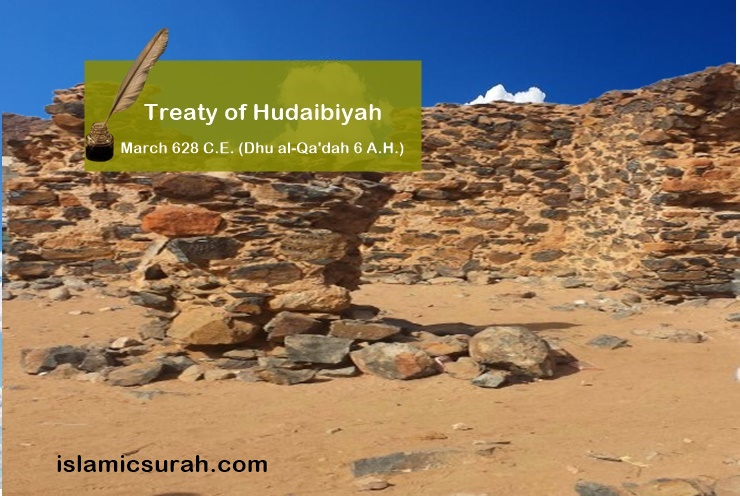The incident at Hudaibiyah marks a significant moment in Islamic history when Muslims unexpectedly turned what seemed like a defeat into a strategic victory.

The History of the Treaty of Hudaibiyah
The pagans of Makkah had confronted the Muslims three times. In the Battle of Badr, the Battle of Uhud, and the Battle of the Trench. Despite winning two of these battles (retreating in Uhud), the Muslims were still not strong enough to launch a counterattack against the sizable forces of the Makkans.
Six years after the Hijrah, in 628 CE, the Prophet Muhammad (peace be upon him) dreamt that he and his followers were entering Mecca and performing tawaf. Interpreting this as a positive sign, he announced his plan to visit Mecca to perform Umrah.
A Prophet’s dream is considered a revelation. Consequently, in Zul-Qa’dah, 6 AH, the Holy Prophet (peace be upon him) set out for Mecca with the intention of performing Umrah. Accompanied by 1,400 of his blessed companions. They were forced to stop at Hudaybiyah, where the unbelievers prevented their entry into Mecca. It was at this location that the treaty, known as the Treaty of Hudaybiyah, was established. Here are some details about this treaty.
Urwah bin Masud’s Observation on the Prophet’s Reverence
Determined to prevent the Muslims from entering the city, the Meccans sent Urwah bin Masud to negotiate with the Prophet. Deeply impressed by the profound respect and devotion of the Prophet’s followers, Urwah remarked, “I have visited the royal courts of the Persians, Romans, and Ethiopians, but I have never witnessed such deep respect and admiration as the followers of Muhammad have for him. They have come solely for worship. Allow them to enter the holy city.” Despite his observations, the Meccan leaders were resolute in their decision to keep the Muslims out.
The Prophet’s Response to the Rumored Death of Uthman
The Prophet Muhammad (peace be upon him) sent Uthman bin Affan to negotiate, but the Meccans detained him and falsely claimed he had been killed. Facing this challenge 400 km from Medina and lacking proper weapons, the Prophet prepared for battle and called his followers to pledge to fight to the death. News of 1,400 volunteers ready to fight reached Mecca, demoralizing the Meccans and leading them to agree to peace negotiations.
They released Uthman and sent Sohayl bin Amr Al-Thaqafi, known for his tough negotiating stance (who later embraced Islam). He discuss the terms of peace with the Prophet Muhammad (peace be upon him).
Conditions of Hudaibiyan Treaty
The Treaty marked a significant victory for the Muslims, who sought to perform the pilgrimage peacefully. Once the Meccans agreed to resolve the situation calmly, the treaty conditions were thoroughly discussed and the following points were established:
- One of the most significant terms of the Treaty of Hudaibiyah was that Muslims would return to Medina without visiting the Kaaba that year. Instead, they would be permitted to enter Mecca and stay peacefully for three days the following year.
- A ceasefire was agreed upon for 10 years, during which both parties were to live in safety and harmony.
- The treaty allowed any tribe to enter into an agreement with the Prophet. Similarly, any tribe wishing to ally with the Quraish could do so.
- Another crucial point was that any Meccan who came to Medina would be returned to the Quraish. But Medina’s people in Mecca would not be granted the same treatment.
Lessons learned from the Treaty of Hudaibiyah
The Treaty of Hudaibiyah holds not only a crucial place in Islamic history but also significant value in contemporary times. It offers several vital lessons to Muslims on patience and gentleness. Here are the lessons one can learn from it,
Patience can solve every problem: Although difficult to attain, patience has the power to resolve any issue. Despite the initial unfavorable conditions of the Treaty for Muslims, Prophet Muhammad (PBUH) demonstrated patience, which ultimately ensured peace.
Resorting to violence is not always the answer: Despite having the support of many brave Muslim brothers, Prophet Muhammad (PBUH) chose to resolve challenges through peaceful negotiations rather than raising his sword. The Treaty of Hudaibiyah highlights the importance of pursuing a path of peace.
The Treaty of Hudaibiyah helped maintain peace between Makkah and Madinah, allowing Muslims to undertake a peaceful pilgrimage to the holy Kaaba and form alliances. For true followers of Islam, it provided essential lessons on peace, patience, and victory.
Also visit topmoralstories for more islamic stories.